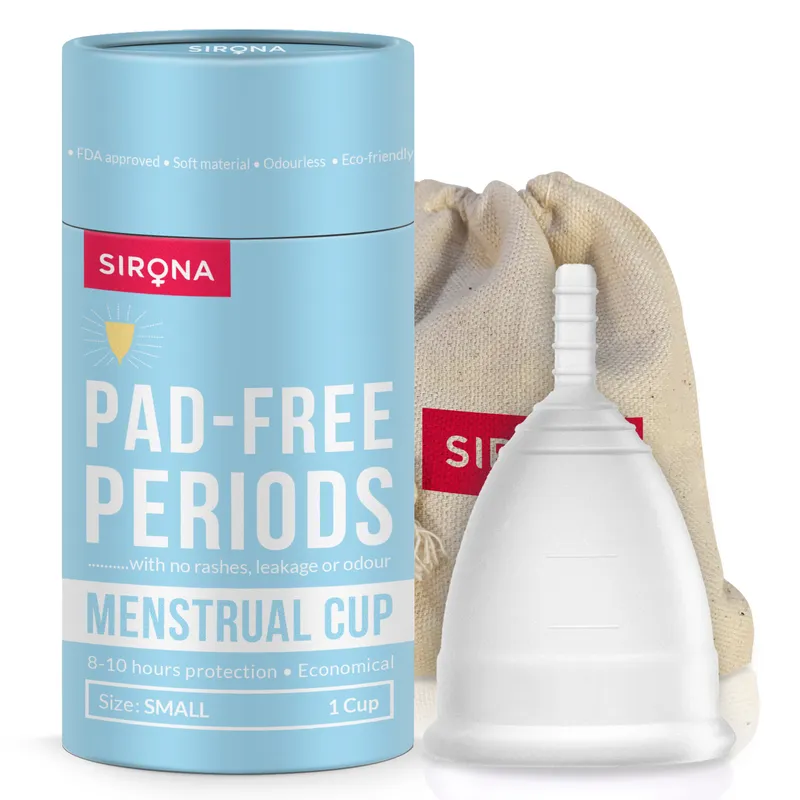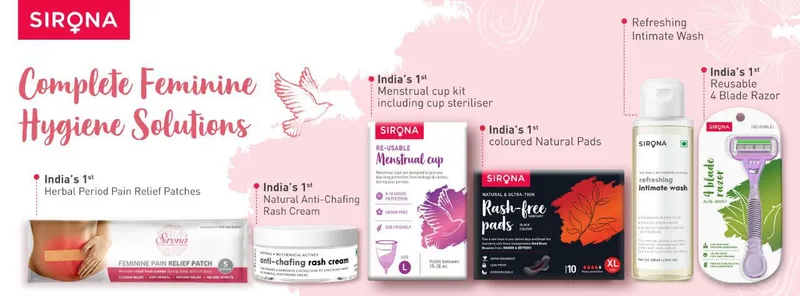Sirona Hygiene is a Mumbai-based feminine hygiene startup that helps women avoid using public restrooms by providing menstrual care. It is recording a 140 percent growth and profits of Rs 26 lakh. The team believes the product differentiations is the key reason for its growth.
For a long period of time, women avoided using public restrooms. Women have always struggled with the ability to relieve themselves while travelling or on a road trip.
However, it was something Deep Bajaj noticed in 2013 while on a road trip, when he witnessed how difficult it was for his wife and her friends to find a clean toilet.
Their primary concern was possible infection from germs on the toilet seat – something that men typically avoid because they can stand when they need to urinate.

“One of them then mentioned a urination device available in Europe that solves this problem for women. It was then that the idea of innovatively solving this daily toilet struggle for women dawned on me. After a lot of research and design trials, we came up with India’s first disposable female urination device that has since been enabling women to stand and pee and avoid touching dirty toilet,” says Deep.
It resulted in the establishment of Sirona Hygiene in 2014, which Deep co-founded with his friends Mohit Bajaj and Rahul Anand, who were also on the trip. Concentrating on feminine hygiene, their first product was PeeBuddy, a seemingly simple and portable paper funnel that assisted women in safely peeing. Sirona has sold over two million PeeBuddy units to date.
A profitable company
Sirona Hygiene is a unique startup today in that it has raised capital and is profitable.
For the last three years, the company has grown at a CAGR of 140 percent and has been profitable since 2019. According to company filings with the Registrar of Companies (RoC), it earned a profit of more than Rs 26.8 lakh in FY20 and more than Rs 19.4 lakh in FY19.
Additionally, the startup raised $3 million in a Series A round from NB Ventures and IAN Fund in April of this year. The additional funds will be used to expand the business and maintain a strong focus on research and development, as Sirona maintains an innovation-driven culture.
“In terms of growth, we have given the country at least 10 India-first products that are solving problems that were unaddressed till now. Our customers have been very actively adopting all of these, which implies the void that existed in the industry before Sirona came into the picture,” says Deep. He believes this is the core reason for the company’s growth and profits.
Much-needed products
Using public restrooms was extremely difficult for women prior to the invention of the PeeBuddy funnel, the female urination device. Sirona’s herbal period pain relief patches, he adds, also eliminated the need for women to use hot water bottles and pain medications, and the product performed exceptionally well.
“Now Sirona’s products, such as menstrual cups – which are now used by over five lakh Indian women, natural rash cream, or face razors or talc-free hair removal cream – all have challenged the status quo, required a change in habit, but customers have embraced them,” says Deep.
Today, Sirona Hygiene has gone beyond PeeBuddy. It now has:
- Sirona Feminine Pain Relief Patches – herbal pain patches for menstrual cramps
- Sirona Oxo-Degradable Disposal Bags – sanitary disposal bags for clean and hygienic disposal of sanitary products
- Sirona Anti-Chafing Rash Cream – natural anti-chafing cream for inner thigh rashes
- PeeBuddy PregRX – An HCG integrated FUD funnel for testing pregnancy at home
- Sirona Ultra-Thin and Natural Black Sanitary Pads – India’s first natural coloured pads
Today, the team ships over 100,000 orders every month. The products are priced from Rs 250 to Rs 500.

What women want
Deep explains it is more important to listen to the customers and solve for their needs than think about scale or opportunity size.
“If our customers need a solution, we go after the problem and come up with unique and relevant solutions. At the development stage, we conduct multiple tests and trials to ensure that the product is good for her (ingredients), for the customers, and the environment,” he adds.
He adds that the team is committed to using sustainable and efficient innovation to address intimate and menstrual hygiene issues. The company’s primary target audience is urban Indian women. Nonetheless, Sirona is equally committed to the hygiene of rural Indian women.
“We provide them with solutions for chafing caused by pads or thighs. Currently, 50% of our sales come from Tier-I cities, while 50% come from Tier-II and III cities. Through Sirona Foundation, we are attempting to bridge the gap of period poverty for the underprivileged or those living in rural areas. We run the Sirona Menstrual Cup project, which educates women about sustainable menstrual hygiene products with the assistance of our non-governmental organisation partners,” Deep explains.

Operating in a ‘taboo’ space
The primary barrier to entry into the feminine intimate and menstrual hygiene space is breaking down taboos and advocating for recognition of the issue. Since their inception in 2014, the team has worked to raise awareness and foster dialogue about intimate and menstrual hygiene, in order to empower more women to use new solutions without hesitation.
“Even when they were willing, the ways to reach out to them were limited when we started. We faced a lot of resistance from the retailers against our first product – PeeBuddy. It did not have a place in the offline market, simply because of the word ‘pee’ on it. But ecommerce is more dynamic, welcomed us with open arms. The online channel brought us closer to our target audience. Since then, women with countless dreadful toilet experiences have been more than happy in adopting PeeBuddy,” says Deep.
Peebuddy is currently available in leading retail outlets such as Mahindra Babyoye, Dabur NewU, Religare, 24×7, Guardian, Health & Glow, Apollo, Medplus, and Le Marche, as well as online marketplaces such as Flipkart, Snapdeal, Amazon, and Ebay.
On the other hand, the team focuses from the start on ensuring that the products are safe – both for the individual and the environment – through the use of safe, natural ingredients.
“Another aspect that distinguishes us is our commitment to those who cannot afford our products but require them. Our pay-it-forward programmes benefit the underprivileged and are funded by the sale of our products,” Deep explains.
The pandemic push
However, the pandemic has refocused public attention on hygiene and sanitation. Sirona has also expanded its manufacturing operations and product portfolio under BodyGuard, the startup’s family wellness and protection line.
These include multi-purpose chlorine tablets, sanitising wipes, multi-purpose disinfectant spray, and face masks, among others.
“Yet, our primary focus remains menstrual hygiene – whether it’s ensuring seamless distribution across online and offline channels or providing free access to solutions for underprivileged women,” Deep adds.
Sirona identifies them as the most vulnerable group, as their menstrual concerns have been pushed further into the background by the pandemic-induced crisis, behind “more immediate monetary concerns.” As a result, Sirona has organised free pad distribution drives. Sirona has also conducted menstrual cup distribution campaigns in collaboration with local NGOs to assist frontline female workers such as doctors and police officers in adopting cups.
Deep explains that prior to the pandemic’s onset, Sirona had been empowering underprivileged women with period education and solutions, while emphasising the importance of menstrual hygiene through its pay-it-forward campaigns.
Together with its healthcare experts and local non-governmental organisations, the team has conducted period awareness campaigns and distributed free menstrual cups to rural women in India, Nepal, and Malawi. Today, they have educated over 10,000 women about menstrual hygiene, saved 24,000,000 pads and tampons, and assisted 169,250,000 women financially.
The market and future
“Sirona is focused on the market for women-oriented products, a large and rapidly growing category,” said Padmaja Ruparel, Founding Partner, IAN Fund, during the recent fundraise. And then, post-pandemic, by expanding its product portfolio to include hygiene products, Sirona created a massive opportunity for itself. However, the bet for us is on the company’s founders and their faith in Deep, his vision to build a category leader, and his passion and ability to scale the company to market leadership.”
According to the global newswire, the Indian market for feminine hygiene products was worth Rs 32.6 billion in 2020 and is expected to grow at a 16.87 percent compound annual growth rate to reach Rs 70.20 billion by 2025. The Woman Company, Plush, Carmesi, and HeyDay are all in the same space.
Sirona aspires to eradicate the stigma associated with menstrual hygiene and redefine femininity for the modern era. Sirona Hygiene has emphasised the importance of hygiene since its inception, offering products for women’s toilet hygiene (PeeBuddy), intimate and menstrual hygiene (Sirona), and family wellness (BodyGuard).
“Since last year, we have been working extra hard to expand our preventive hygiene range and will continue to do so. We intend to scale our operation and expand our team in the future,” Deep explains.




